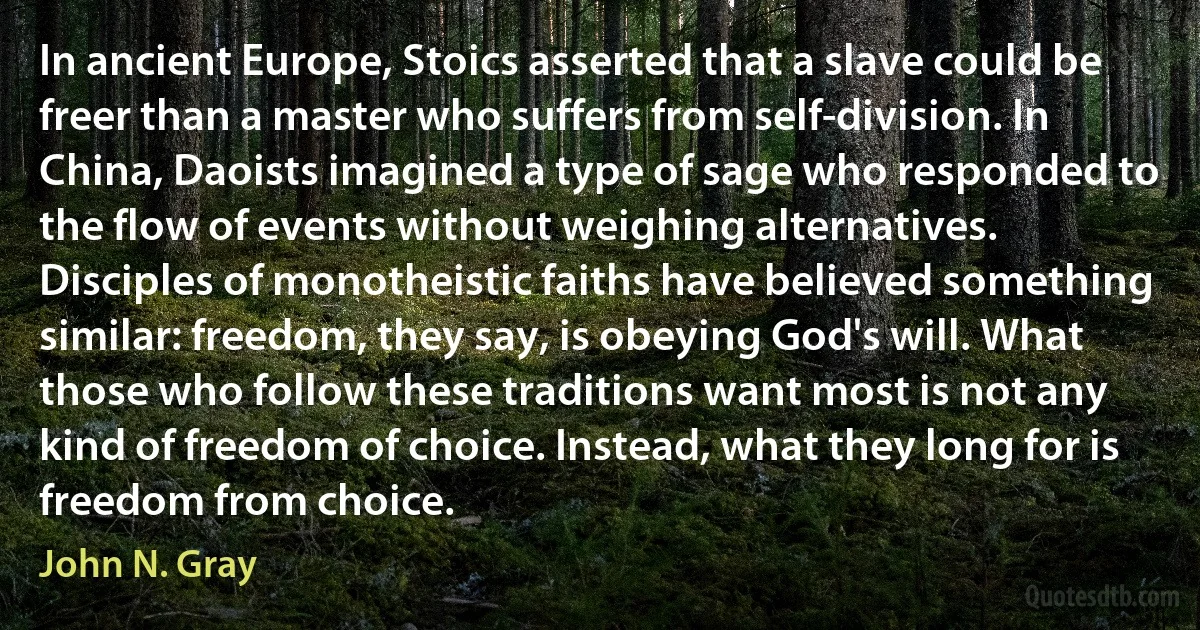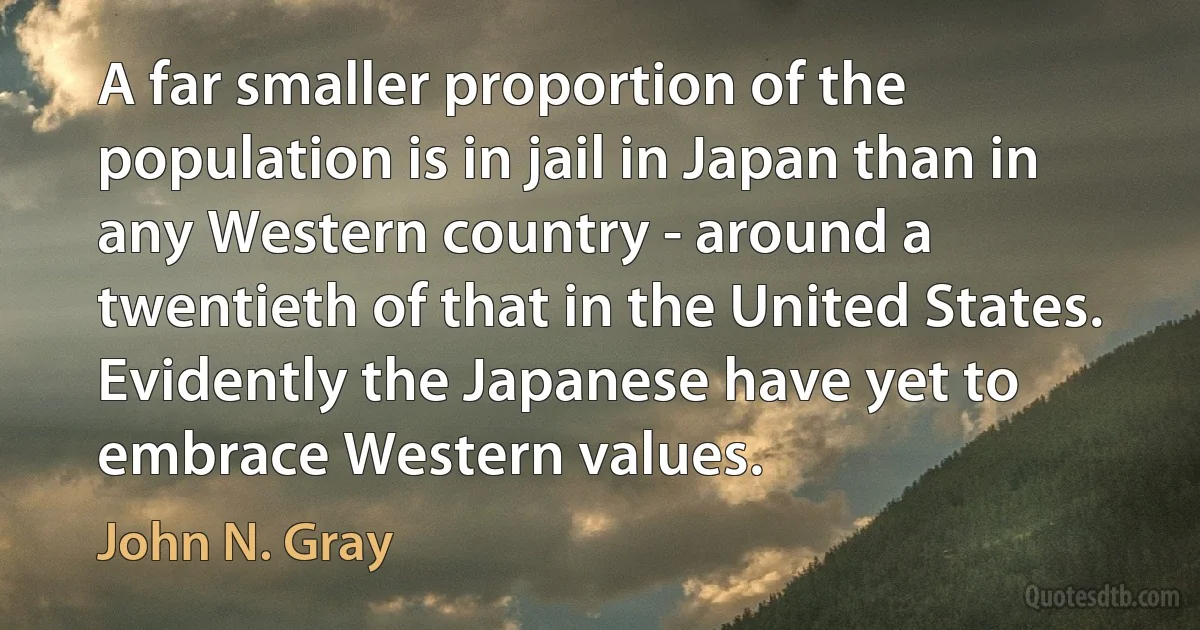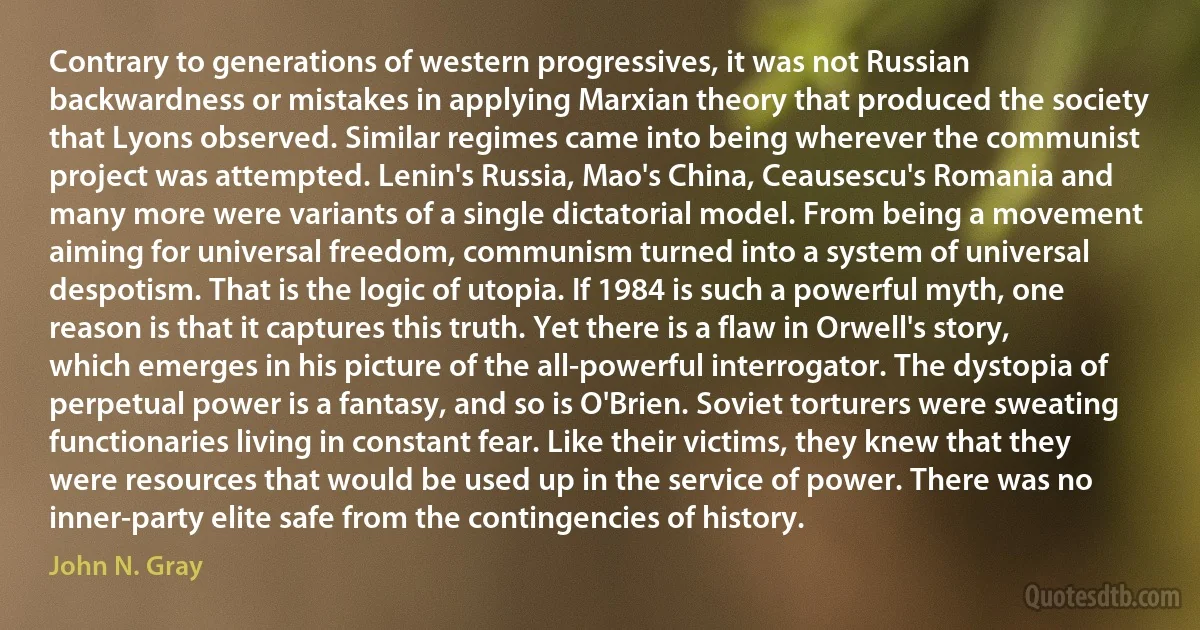John N. Gray quotes - page 2
John N. Gray is a British philosopher and author, widely known for his critiques of liberalism and humanism. His works address topics such as political philosophy, the limits of progress, and the complexities of human nature. He has profoundly influenced contemporary debates on politics, ethics, and society. Here are 159 of his quotes:
Philosophers have always tried to show that we are not like other animals, sniffing their way uncertainly through the world. Yet after all the work of Plato and Spinoza, Descartes and Bertrand Russell we have no more reason than other animals do for believing that the sun will rise tomorrow.

John N. Gray
Evangelical atheists preach the need for a scientific view of things, but a settled view does not go with scientific method. If we know anything it is that most of the theories that prevail at any one time are false. Scientific theories are not components of a world-view but tools we use to tinker with the world.

John N. Gray
Not everything in religion is precious or deserving of reverence. There is an inheritance of anthropocentrism, the ugly fantasy that the Earth exists to serve humans, which most secular humanists share. There is the claim of religious authorities, also made by atheist regimes, to decide how people can express their sexuality, control their fertility and end their lives, which should be rejected categorically. Nobody should be allowed to curtail freedom in these ways, and no religion has the right to break the peace.

John N. Gray
Science cannot be used to reshape humankind in a more rational mould. Any new-model humanity will only reproduce the familiar deformities of its designers. It is a strange fancy to suppose that science can bring reason to an irrational world, when all it can ever do is give another twist to the normal madness.

John N. Gray
Even the deepest contemplation only recalls us to our unreality. Seeing that the self we take ourselves to be is illusory does not mean seeing through it to something else. It is more like surrendering to a dream. To see ourselves as figments is to awake, not to reality, but to a lucid dream, a false awakening that has no end.

John N. Gray
Today everyone knows that inequality is wrong. A century ago everyone knew that gay sex was wrong. The intuitions people have on moral questions are intensely felt. They are also shallow and transient to the last degree.... Justice is an artefact of custom. Where customs are unsettled its dictates soon become dated. Ideas of justice are as timeless as fashion in hats.

John N. Gray
Those who struggle to change the world see themselves as noble, even tragic figures. Yet most of those who work for world betterment are not rebels against the scheme of things. They seek consolation for a truth they are too weak to bear. At bottom, their faith that the world can be transformed by human will is a denial of their own mortality.

John N. Gray
In modern times, the immortal longings of the mystics are expressed in a cult of incessant activity. Infinite progress . . . infinite tedium. What could be more dreary than the perfection of mankind? The idea of progress is only the longing for immortality given a techno-futurist twist. Sanity is not found here, nor in the moth-eaten eternities of the mystics. Other animals do not pine for a deathless life. They are already in it. Even a caged tiger passes its life half out of time. Humans cannot enter that never-ending moment. They can find a respite from time when - like Odysseus, who refused Calypso's offer of everlasting life on an enchanted island so he could return to his beloved home - they no longer dream of immortality.

John N. Gray
In the Greek world in which Homer's songs were sung, it was taken for granted that everyone's life is ruled by fate and chance. For Homer, human life is a succession of contingencies: all good things are vulnerable to fortune. Socrates could not accept this archaic tragic vision. He believed that virtue and happiness were one and the same: nothing can harm a truly good man. So he re-envisioned the good to make it indestructible. Beyond the goods of human life - health, beauty, pleasure, friendship, life itself - there was a Good that surpassed them all. In Plato, this became the idea of the Form of the Good, the mystical fusion of all values into a harmonious spiritual whole - an idea later absorbed into the Christian conception of God. But the idea that ethics is concerned with a kind of value that is beyond contingency, that can somehow prevail over any kind of loss or misfortune, came from Socrates. It was he who invented 'morality'.

John N. Gray
...we are approaching a time when, in Moravec's words, 'almost all humans work to amuse other humans.' In rich countries, that time has already arrived. The old industries have been exported to the developing world. At home, new occupations have evolved, replacing those of the industrial era. Many of them satisfy needs that in the past were repressed or disguised. A thriving economy of psychotherapists, designer religions and spiritual boutiques has sprung up. Beyond that, there is an enormous grey economy of illegal industries supplying drugs and sex. The function of this new economy, legal and illegal, is to entertain and distract a population which - though it is busier than ever before - secretly suspects that it is useless. Industrialisation created the working class. Now it has made the working class obsolete. Unless it is cut short by ecological collapse, it will eventually do the same to nearly everyone.

John N. Gray
Human rights are not just cultural or legal constructions, as fashionable western relativists are fond of claiming. They are universal values. To deny the benefits of the new regime of rights to other cultures is to patronise them in a way that is reminiscent of the colonial era. If the new regime on torture is good enough for the US, who can say that it is not good for everyone?

John N. Gray
From a Darwinian point of view, human beliefs are adaptations to our part of the world. No doubt much of what we believe must be roughly accurate, or else we would not have survived. But the beliefs we have evolved might latch on to the world only enough to help us stumble our way through it, and then only for the time being. Human belief-systems could be useful illusions, appearing and disappearing as they prove to be more or less advantageous in the random walk of natural selection. Might not evolution be one of these illusions? Scientific naturalism is the theory that human beliefs are evolutionary adaptations whose survival has nothing to do with their truth. But in that case scientific naturalism is self-defeating, since on its own premises scientific theories cannot be known to be true.

John N. Gray
As Malaparte saw it, Naples was a pagan city with an ancient sense of time. Christianity taught those who were converted to it to think of history as the unfolding of a single plot – a moral drama of sin and redemption. In the ancient world there was no such plot – only a multitude of stories that were forever being repeated. Inhabiting that ancient world, the Neapolitans did not expect any fundamental alteration in human affairs. Not having accepted the Christian story of redemption, they had not been seduced by the myth of progress. Never having believed civilization to be permanent, they were not surprised when it foundered.

John N. Gray
Through all of history and pre-history it has been accepted that there is something wrong with the human animal. Health may be the natural condition of other species, but in humans it is sickness that is normal. To be chronically unwell is part of what it means to be human. It is no accident that every culture has its own versions of therapy. Tribal shamans and modern psychotherapists answer the same needs and practise the same trade.

John N. Gray
No doubt markets transmit information in the way that Hayek claimed. But what reason is there to believe that – unlike any other social institution – they have a built-in capacity to correct their mistakes? History hardly supports the supposition. Moods of irrational exuberance and panic can, and often do, swamp the price-discovery functions of markets.

John N. Gray
Hayek watched the interwar collapse with horror, as Keynes did, and shared many of Keynes's liberal values. What he failed to understand is that these values cannot be renewed by applying any formula or doctrine, or by trying to construct an ideal liberal regime in which freedom is insulated from the contingencies of politics.

John N. Gray
John N. Gray

Photo:
Vera de Kok,
CC BY-SA 4.0
Occupation: British Author
Born: April 17, 1948
Quotes count: 159
Wikipedia: John N. Gray










